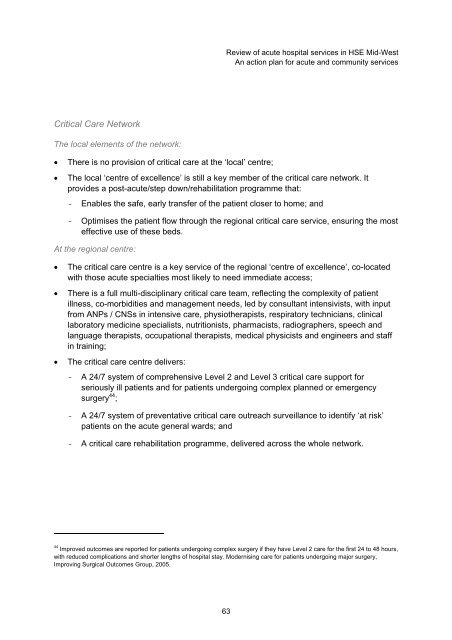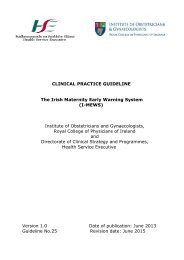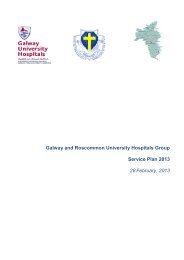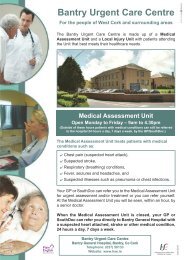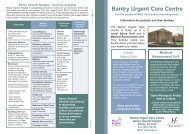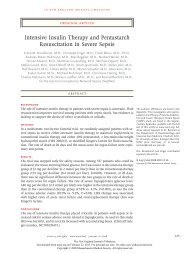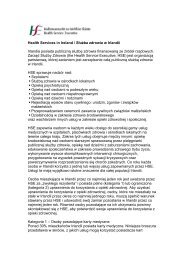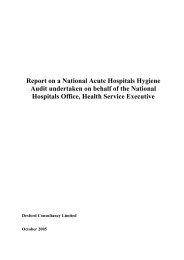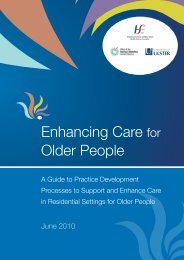Review of acute hospital services in the Mid - Health Service Executive
Review of acute hospital services in the Mid - Health Service Executive
Review of acute hospital services in the Mid - Health Service Executive
- TAGS
- acute
- www.hse.ie
Create successful ePaper yourself
Turn your PDF publications into a flip-book with our unique Google optimized e-Paper software.
Critical Care Network<br />
The local elements <strong>of</strong> <strong>the</strong> network:<br />
• There is no provision <strong>of</strong> critical care at <strong>the</strong> ‘local’ centre;<br />
<strong>Review</strong> <strong>of</strong> <strong>acute</strong> <strong>hospital</strong> <strong>services</strong> <strong>in</strong> HSE <strong>Mid</strong>-West<br />
An action plan for <strong>acute</strong> and community <strong>services</strong><br />
• The local ‘centre <strong>of</strong> excellence’ is still a key member <strong>of</strong> <strong>the</strong> critical care network. It<br />
provides a post-<strong>acute</strong>/step down/rehabilitation programme that:<br />
- Enables <strong>the</strong> safe, early transfer <strong>of</strong> <strong>the</strong> patient closer to home; and<br />
- Optimises <strong>the</strong> patient flow through <strong>the</strong> regional critical care service, ensur<strong>in</strong>g <strong>the</strong> most<br />
effective use <strong>of</strong> <strong>the</strong>se beds.<br />
At <strong>the</strong> regional centre:<br />
• The critical care centre is a key service <strong>of</strong> <strong>the</strong> regional ‘centre <strong>of</strong> excellence’, co-located<br />
with those <strong>acute</strong> specialties most likely to need immediate access;<br />
• There is a full multi-discipl<strong>in</strong>ary critical care team, reflect<strong>in</strong>g <strong>the</strong> complexity <strong>of</strong> patient<br />
illness, co-morbidities and management needs, led by consultant <strong>in</strong>tensivists, with <strong>in</strong>put<br />
from ANPs / CNSs <strong>in</strong> <strong>in</strong>tensive care, physio<strong>the</strong>rapists, respiratory technicians, cl<strong>in</strong>ical<br />
laboratory medic<strong>in</strong>e specialists, nutritionists, pharmacists, radiographers, speech and<br />
language <strong>the</strong>rapists, occupational <strong>the</strong>rapists, medical physicists and eng<strong>in</strong>eers and staff<br />
<strong>in</strong> tra<strong>in</strong><strong>in</strong>g;<br />
• The critical care centre delivers:<br />
- A 24/7 system <strong>of</strong> comprehensive Level 2 and Level 3 critical care support for<br />
seriously ill patients and for patients undergo<strong>in</strong>g complex planned or emergency<br />
surgery 44 ;<br />
- A 24/7 system <strong>of</strong> preventative critical care outreach surveillance to identify ‘at risk’<br />
patients on <strong>the</strong> <strong>acute</strong> general wards; and<br />
- A critical care rehabilitation programme, delivered across <strong>the</strong> whole network.<br />
44 Improved outcomes are reported for patients undergo<strong>in</strong>g complex surgery if <strong>the</strong>y have Level 2 care for <strong>the</strong> first 24 to 48 hours,<br />
with reduced complications and shorter lengths <strong>of</strong> <strong>hospital</strong> stay. Modernis<strong>in</strong>g care for patients undergo<strong>in</strong>g major surgery,<br />
Improv<strong>in</strong>g Surgical Outcomes Group, 2005.<br />
63


